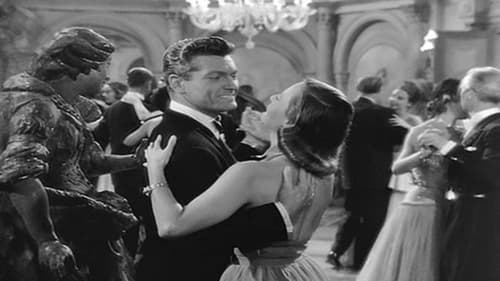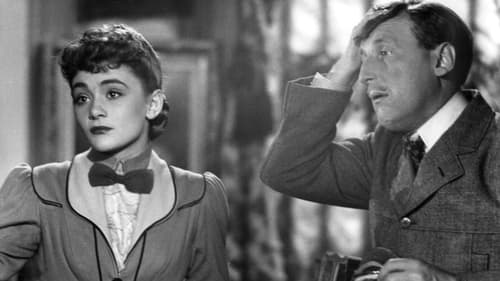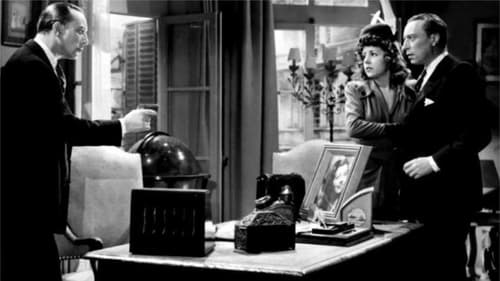
The life story of famed French aviatrix Helene Boucher is detailed in Horizons sans fin (Endless Horizons). Giselle Pascal stars as Boucher, who is first seen in 1930, leaving her millinery shop behind in favor of the wild blue yonder. Though the world of aviation was still essentially an all-male one (despite England's Amy Johnson and America's Amelia Earhart), Boucher perseveres, eventually breaking all existing male and female speed and height records. A bit slow on the uptake in the dramatic scenes, the film soars (no pun intended) during the aerial sequences. Horizons san Fin was the winner of the Catholic Award at the 1953 Cannes Film Festival.

Mr and Mrs Barbezat,Concierges are to marry their only daughter to a butcher's boy. Both the in-laws and the groom have an obsession: come what may, they are keen on honoring their engagements: promises are made to be kept is their motto. And when, on the wedding day, the unfortunate parents cannot provide the newly weds with...the "Mérinos" mattress which is part of the bride's Trousseau ,they are desperate. The husband will spend the whole wedding festivities trying to keep his word.

A singer wants to get rid of his mistress to marry a young admirer.

A young girl marries a man she doesn't love and delights in humiliating him.

Evelyne, a judge's young wife, falls in love with Rémy while vacationing in Italy. Upon returning home, she must decide between telling her husband and continuing to see Rémy.

(uncredited)
The wealthy industrialist Alain de Narbois has disappeared. Michel Dunant, an idle man who passed by and who looks exactly like the deceased, is taken for Alain by a young woman and her servant. He jumps at the chance but quickly realizes that, in this hushed little world, masters and servants play comedy and know very well that he is only a double of Alain. In fact, the industrialist was assassinated.

When Charles learns that his wife and her lover want to poison him, he thinks of killing both of them.

(uncredited)
The evocation of Paris in the 1920s mingles with the rapid rise of the irresistible Caprice, a talented singer, and her tumultuous love affair with Jeff the composer. A photographer nicknamed Bagnolet, a gentle anarchist, gently monitors the activities of Caprice, who has become Lady Paname and, in the absence of morality, makes love triumph.

(uncredited)
A provincial ingenue leaves her mother’s tobacco shop with dreams of a life in the Parisian theater, only to become entangled in relationships with a lecherous aristocrat, his starry-eyed nephew, and an old ham actor.

A provincial, Julie Moret, is hired as a servant in a Parisian bourgeois residence. She is courted by one of the Bouquinquant brothers, Léon, who does not take long to ask her to marry him. Alas, Léon turns out to be violent, alcoholic and lazy. Faced with her misfortune, Julie gets closer to her brother-in-law Pierre, the opposite of Léon, serious and hardworking, and they become lovers. The drama will rush when Julie becomes pregnant with Pierre.

(uncredited)
A smooth criminal, who turns to be Manuel Ismora, and his gang successfully and peacefully pull off con after heist. Elsewhere a timid office worker, Gabriel Dupon, is pressured by his boss...

Alain Marchal, wrongly accused of murdering his wife, escapes from prison the day before his execution. Before committing suicide, he contacts Monsieur Charles, a retired gangster, and asks him to investigate, find the real culprit and clear his name. Monsieur Charles accepts his request and along with his wife Ginette and two former accomplices, Paragraphe and Teddy Coffre fort, embarks on his counter-investigation.

In the Camargue, the rich owner Jules Fabregoul squanders all his fortune to please his mistress, a Parisian actress with luxury tastes. But he is not the only one to be in trouble. His niece is having sentimental problems: she thinks she is being cheated on by her fiance Gérard, a music-hall artist. She takes refuge with Jules's sister, Aunt Fabregoul, the director of a home for repentant young girls. But Gérard did not make a mistake and the reconciliation takes place during the recording of a radio program.










